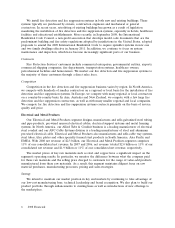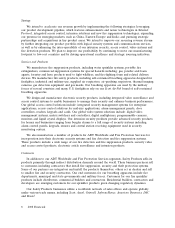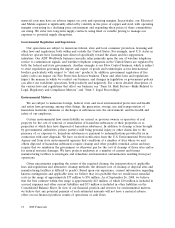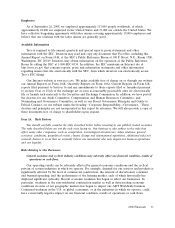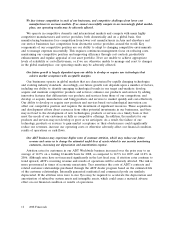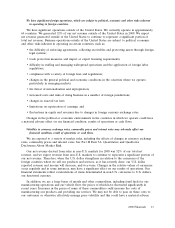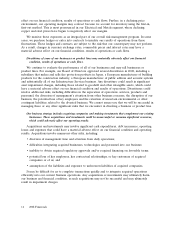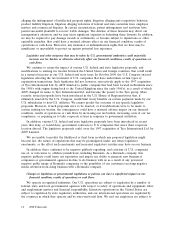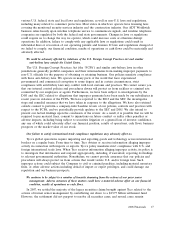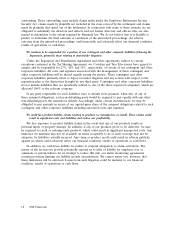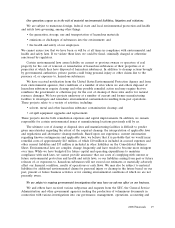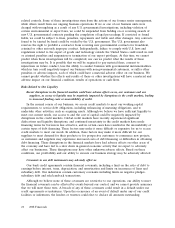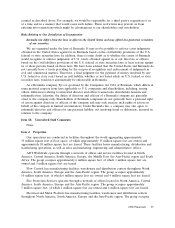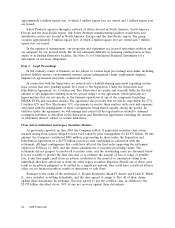ADT 2008 Annual Report Download - page 119
Download and view the complete annual report
Please find page 119 of the 2008 ADT annual report below. You can navigate through the pages in the report by either clicking on the pages listed below, or by using the keyword search tool below to find specific information within the annual report.alleging the infringement of intellectual property rights, litigation alleging anti-competitive behavior,
product liability litigation, litigation alleging violations of federal and state securities laws, employee
matters and commercial disputes. In certain circumstances, patent infringement and anti-trust laws
permit successful plaintiffs to recover treble damages. The defense of these lawsuits may divert our
management’s attention, and we may incur significant expenses in defending these lawsuits. In addition,
we may be required to pay damage awards or settlements, or become subject to injunctions or other
equitable remedies, that could have a material adverse effect on our financial condition, results of
operations or cash flows. Moreover, any insurance or indemnification rights that we have may be
insufficient or unavailable to protect us against potential loss exposures.
Legislative and other measures that may be taken by U.S. governmental authorities could materially
increase our tax burden or otherwise adversely affect our financial conditions, results of operations or
cash flows.
We continue to assess the impact of various U.S. federal and state legislative proposals, and
modifications to existing tax treaties between the United States and foreign countries, that could result
in a material increase in our U.S. federal and state taxes. In October 2004, the U.S. Congress enacted
legislation affecting the tax treatment of U.S. companies that have undertaken certain types of
expatriation transactions. Such legislation did not, however, retroactively apply to the 1997 acquisition
of Tyco International Ltd. by ADT Limited (a public company that had been located in Bermuda since
the 1980’s with origins dating back to the United Kingdom since the early 1900’s), as a result of which
ADT changed its name to Tyco International Ltd. and became the parent to the Tyco group. More
recently, several proposals have been introduced in the U.S. House of Representatives that, if
ultimately enacted by the U.S. Congress, would limit treaty benefits on certain payments made by our
U.S. subsidiaries to non-U.S. affiliates. We cannot predict the outcome of any specific legislative
proposals. However, if such proposals were to be enacted, or if modifications were to be made to
certain existing tax treaties, the consequences could have a material adverse impact on our financial
condition, results of operations or cash flows by increasing our tax burden, increasing costs of our tax
compliance, or requiring us to take corporate actions in response to government initiatives.
In addition, various U.S. federal and state legislative proposals have been introduced in recent
years that deny, or would deny, government contracts to U.S. companies that move their corporate
location abroad. The legislative proposals could cover the 1997 acquisition of Tyco International Ltd. by
ADT Limited.
We are unable to predict the likelihood or final form in which any proposed legislation might
become law, the nature of regulations that may be promulgated under any future legislative
enactments, or the effect such enactments and increased regulatory scrutiny may have on our business.
In addition, there continues to be negative publicity regarding, and criticism of, U.S. companies’
use of, or relocation to, offshore jurisdictions, including Bermuda. As a Bermuda company, this
negative publicity could harm our reputation and impair our ability to generate new business if
companies or governmental agencies decline to do business with us as a result of any perceived
negative public image of Bermuda companies or the possibility of our customers receiving negative
media attention from doing business with a Bermuda company.
Changes in legislation or governmental regulations or policies can have a significant impact on our
financial condition, results of operations or cash flows.
We operate in regulated industries. Our U.S. operations are subject to regulation by a number of
federal, state and local governmental agencies with respect to safety of operations and equipment, labor
and employment matters and financial responsibility. Intrastate operations in the United States are
subject to regulation by state regulatory authorities, and our international operations are regulated by
the countries in which they operate and by extra-territorial laws. We and our employees are subject to
16 2008 Financials


